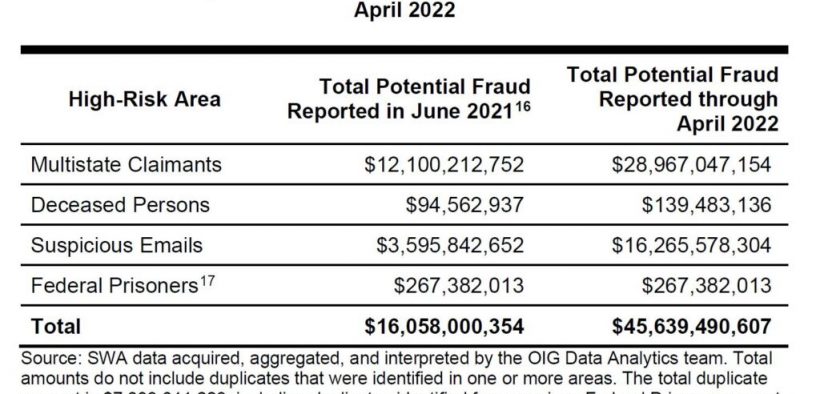$46 Billion In ‘Covid’ Unemployment Subsidies Probably Went To Fraudsters
Share

Haley Joel Osment sees dead people. Government officials give them welfare benefits.
That conclusion comes from a report recently released by the Labor Department’s inspector general, providing an update on its investigations of pandemic-related unemployment fraud. Unfortunately, the document provides only the tip of the proverbial iceberg, both in identifying the scope of the problem and holding fraudsters to account.
$46 Billion Down the Drain
The inspector general report updated earlier documents quantifying the scope of potentially fraudulent unemployment insurance payments made during the pandemic. Specifically, the office examined four types of potential fraud: claims 1) filed in multiple states; 2) made in the name of deceased individuals; 3) using suspicious email accounts; or 4) filed by federal prisoners.
The chart below demonstrates the growth in potentially fraudulent unemployment insurance payments made since March 2020.
The $46 billion figure underestimates the potential fraud, for several reasons. For instance, investigators did not have current data on federal prisoners, so could not update last year’s estimate of suspicious payments in this category. The total also excludes potential fraud not included in one of the four categories — from claims made by state prisoners to those with less obvious red flags.
Little Accountability for Fraudsters
A press release accompanying the report hinted at the massive nature of the fraud. A few sentences discussed efforts to hold scammers to account:
With less than 140 criminal investigators, the [inspector general] leveraged data analytics to direct its limited resources to those matters that pose the greatest risk to the [unemployment insurance] program. The [inspector general] is focusing on large-scale identity theft schemes involving multiple victims and organized criminal groups, including street gangs.
In other words, if someone doesn’t belong to a gang, or “only” submitted fraudulent claims for a few thousand dollars (or even
Continue Reading at The Federalist.













